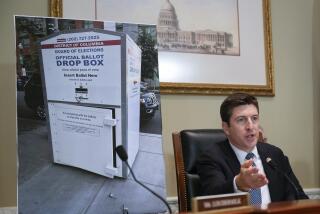Conferees Agree to Allow Count of Illegals in Census
- Share via
WASHINGTON — In a major victory for California and other states with large immigrant populations, Senate and House negotiators agreed Thursday to allow illegal aliens to be counted in the 1990 Census.
Representatives of the Senate dropped their insistence on a Senate-approved amendment to an appropriations bill for the departments of State, Justice and Commerce that would have barred the Census from including aliens in the decennial head count.
The House twice has rejected efforts to exclude aliens from the count, most recently on a 232-184 roll call that derailed an attempt to put the House on record in favor of the Senate provision.
Under congressional procedures, the agreement worked out at a Senate-House conference will go back to each body for approval before it is sent to President Bush. It was considered likely to be approved.
Opponents of excluding aliens--including the Bush Administration--said it would be both unconstitutional and unworkable to prevent the counting of aliens who were in the country without permission.
In addition, they said, it would cost an additional $44 million to print 170 million Census forms with new questions about legal status.
At stake were shifts in the size of congressional delegations following reapportionment based on the 1990 population count, as well as millions of dollars in federal aid distributed on a per capita basis.
The Administration and other proponents of counting illegal immigrants have noted that the Constitution provides that “all persons” shall be counted every 10 years by the Census.
Secretary of Commerce Robert A. Mosbacher had said he would ask Bush to veto the money bill if it contained the Senate’s provision to exclude illegal aliens.
California, Florida, Texas and New York were the states considered likely to be the greatest beneficiaries from the conference agreement to drop the Senate amendment in the final version of the bill.
Representatives from Pennsylvania, Illinois and other states that stand to loose one or two seats in the next reapportionment, however, argued strongly that it was wrong to count residents who have no legal right to be in the United States.
“Illegal aliens ought to be deported, not counted,” said Sen. Thad Cochran (R-Miss.), during the Senate debate on the issue.
Sen. Pete Wilson (R-Calif.) argued, however, that states that have experienced a surge of illegal immigration are faced with substantial additional costs that the federal government should help to meet.
In the House, a procedural move prevented Rep. Tom Ridge (R-Pa.) from offering a proposal to bar aliens from the Census count. The vote against Ridge was 232 to 184, effectively instructing House conferees to resist the Senate rider.
The Senate’s decision to back off its proposal reflected the narrow division on the issue in that chamber. While the amendment to bar inclusion of aliens was adopted by voice vote, the Senate cleared the way for its acceptance by a slim 50-41 roll call.
Rep. Neal Smith (D-Iowa), head of the House delegation to the conference that worked out the agreement, strongly opposed the exclusion of aliens as unconstitutional.
In addition, many members of Congress said the accuracy of the decennial count to be conducted next April 1 would be undermined if census-takers had to decide the often thorny issue of an immigrant’s legal status.
Both sides agreed that the issue would not go away. It almost certainly will be raised again before the census is taken in the year 2000. Rep. Bill Richardson (D-N.M.) said it would be regarded by the Latino community as a civil rights vote in the coming years.
Under the proposal advanced unsuccessfully by Ridge in the House, aliens would have been counted for the purpose of distributing federal funds but not counted for the purpose of allocating House seats to the states.
The debate pitted the growing Sun Belt states in the South and West against those in the northern Snow Belt that have been losing population or not gaining at the same rate as California, Florida and others where illegal immigrants have settled.
More to Read
Get the L.A. Times Politics newsletter
Deeply reported insights into legislation, politics and policy from Sacramento, Washington and beyond. In your inbox twice per week.
You may occasionally receive promotional content from the Los Angeles Times.










